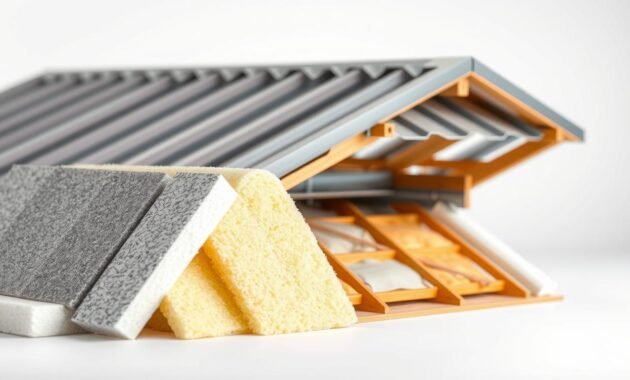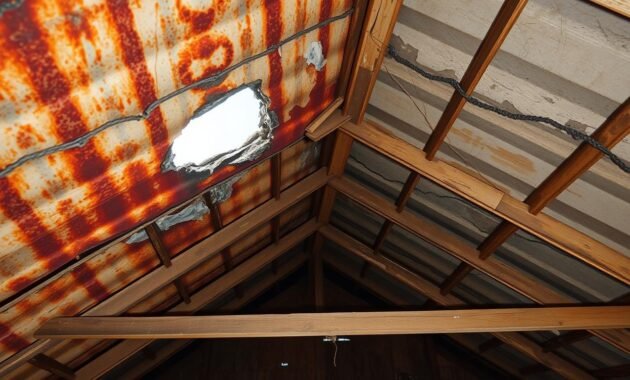Are you fed up with high energy bills and uncomfortable temperatures inside? Metal roofs don’t keep your home warm or cool enough on their own. Without insulation, you’ll see your energy costs soar and your comfort levels drop.
It’s not just about keeping your home at a good temperature. Many homeowners ignore roof insulation, leaving their homes exposed to harsh weather. The right insulation can cut your energy bills by 30% and make your roof last 20-30% longer.
Adding quality insulation is the key. It boosts your home’s energy efficiency, reduces noise, and makes it more comfortable. It’s time to make your metal roof work better for you.
Understanding the Importance of Metal Roof Insulation
Metal roofs have their own set of challenges and benefits when it comes to insulation. As a homeowner, I’ve found that the right insulation is key for a cozy and energy-saving home. The right insulation can turn your metal roof into a top-notch building part.
Energy Efficiency Benefits
Insulation is a big deal for metal roofs. It can cut your energy bills by up to 30%. Metal roofs already reflect the sun’s rays, but insulation boosts energy efficiency even more. It keeps your home cool in summer and warm in winter.
- Reduce energy consumption by up to 30%
- Minimize heat transfer through the roof
- Create a more consistent indoor temperature
Temperature Control Advantages
Temperature control is key when choosing insulation for metal roofs. I’ve seen how insulation can make your home much more comfortable. Without it, metal roofs can get scorching hot in summer and freezing in winter.
Read also: What is Purlin Span for Metal Roof ?
| Insulation Type | R-Value | Temperature Performance |
|---|---|---|
| Spray Foam | 6-7 per inch | Excellent temperature control |
| Rigid Foam | 5-6.5 per inch | Very Good temperature regulation |
| Fiberglass | 2.9-4.3 per inch | Good temperature management |
Moisture Prevention Properties
Insulation also helps prevent moisture and noise. I’ve learned that good insulation can cut condensation risks by up to 50%. This is important to stop mold and damage.
- Prevent up to 90% of noise during rain
- Reduce condensation risks
- Protect against possible structural damage
The right insulation does more than just protect your roof. It changes your whole living experience. By choosing quality insulation, you make your home more comfortable, energy-efficient, and long-lasting.
Types of Insulation Under Metal Roof

Homeowners have many options for insulating a metal roof. Each type has its own benefits and how well it works can affect your home’s energy use and comfort.
Let’s look at the most common insulation materials:
- Spray Foam Insulation
- Closed cell insulation has a high R-value of 6-7 per inch
- It’s great at stopping air and moisture
- Perfect for keeping warmth in cold places
- Rigid Boards
- Has an R-value of 4-6 per inch
- Works well in all climates
- It’s light and easy to put in place
- Fiberglass Batts
- Offers an R-value of 3-4 per inch
- It’s a budget-friendly choice
- Needs careful installation to work well
Experts say to think about your climate, budget, and building needs when picking insulation. Closed cell insulation is top for its heat and moisture protection. Rigid boards are versatile for different places.
The International Residential Code says you need at least R-30 insulation for metal roofs. But, this can change based on where you live. Good insulation means saving on energy and feeling more comfortable inside.
Benefits of Proper Metal Roof Insulation Systems
Metal roofing panels need the right insulation to work their best. As a roofing expert, I’ve seen how good insulation can turn a simple roof into a top-notch building part.
Choosing the right insulation for metal roofs brings many benefits. It’s not just about keeping the temperature right. The right insulation can make your building work better overall.
Cost Savings on Energy Bills
Good insulation cuts down on heating and cooling costs. Metal roofs with the right insulation can save 10-20% on energy. This means big savings for homeowners and business owners over time.
- Reduces thermal transfer
- Minimizes energy consumption
- Lowers monthly utility expenses
Extended Roof Lifespan
A well-insulated metal roof faces less stress from temperature changes. Insulation stops condensation and protects against moisture damage. This can make your roof last longer. Many Galvalume products now come with 45-50 year warranties if you take care of them.
| Insulation Type | Lifespan Impact | Energy Efficiency |
|---|---|---|
| Spray Foam | High Protection | Excellent Performance |
| Rigid Foam | Good Protection | Strong Thermal Barrier |
| Fiberglass | Standard Protection | Moderate Efficiency |
Enhanced Indoor Comfort
The right insulation makes your indoor space more comfortable. It blocks outside noise and keeps temperatures steady. This means a more comfortable place to live or work, no matter the season.
Choosing the right insulation for your metal roof is key. Getting advice from a pro can help you pick the best option for your building.
Common Problems Without Metal Roof Insulation

Not insulating your metal roof can cause big problems. Metal roofs easily let heat pass through, leading to issues beyond just keeping cool.
Without the right insulation, like rigid board or open cell spray foam, you’ll face serious issues:
- Excessive heat transfer during summer months
- Increased energy consumption
- Potential condensation buildup
- Noise problems during rain or hail
- Reduced overall cooling efficiency
Foam board insulation helps solve these problems. Without it, homes can lose up to 30% of their energy, raising utility bills. Condensation is also a big worry, affecting 30% of homes without enough insulation. It can lead to mold and damage.
| Problem | Potential Impact |
|---|---|
| Heat Transfer | Up to 30% energy inefficiency |
| Condensation | Potential mold growth and structural damage |
| Energy Costs | 10-15% increase in air conditioning expenses |
Ignoring insulation can harm your roof’s long-term health. It might need expensive fixes and could shorten its life. Good insulation is more than just keeping cool—it’s about keeping your home safe and sound.
Different Installation Methods for Metal Roof Insulation
Choosing the right way to install metal roof insulation is key for your home’s energy use and comfort. There are many options for metal roof insulation. This means homeowners can pick the best way to keep their buildings cool or warm.
It’s important to know how to install insulation well for the best results. I’ll explain the main ways and things to think about for metal roof insulation.
Read also: How to Insulate a Shed Roof and a Metal Roof
Professional Installation Process
Getting a pro to install insulation is usually the safest and most effective choice. They follow a detailed plan:
- They check the roof carefully
- They figure out how much insulation you need
- They clean and get the roof ready
- They pick the right insulation materials
- They use special tools to apply the insulation
DIY Installation Guidelines
If you like doing home projects, you can try installing insulation yourself. Here’s what to do:
- Get the right safety gear
- Measure your roof’s size right
- Choose the right insulation materials
- Make sure there’s good air flow
- Follow the instructions from the manufacturer closely
Safety Considerations
Always think about safety when you’re working on insulation. Wear protective clothes, work with someone, and know the dangers. Spray foam insulation needs special care to be applied right and keep you safe.
About 80% of insulation problems come from bad installation. This shows how critical it is to plan and do it right, whether you hire a pro or do it yourself.
Comparing Insulation Materials for Metal Roofs
Choosing the right insulation for a metal roof is key for keeping your home comfy and energy-efficient. Each insulation type has its own strengths and weaknesses. Homeowners need to weigh these carefully.
I’ve looked into several insulation options to guide you:
- Spray foam insulation has top-notch thermal performance, with R-values from R-6.0 to R-8.0 per inch for closed-cell types
- Rigid boards have great thermal resistance, between R-4.0 to R-8.0 per inch
- Fiberglass batts are a budget-friendly and common choice
When picking insulation, consider a few important things:
| Insulation Type | R-Value | Moisture Resistance | Cost |
|---|---|---|---|
| Spray Foam | R-6.0 – R-8.0 | Excellent | Higher |
| Rigid Boards | R-4.0 – R-8.0 | Very Good | Moderate |
| Fiberglass Batts | R-2.9 – R-3.8 | Limited | Low |
Spray foam insulation is a top pick for its air-tight seal. It can grow up to 100 times its original size, making it a strong thermal barrier. Rigid boards are great at keeping moisture out, perfect for humid areas.
Climate and budget are big factors in your choice. In hot areas, reflective foil insulation can cut down radiant heat by up to 95%. This could save 5-10% on cooling costs. It’s wise to get a pro to install spray foam for the best results.
Best Practices for Insulating Metal Roofs
Choosing the right insulation for your metal roof is key. It keeps your home energy-efficient and safe. I’ll show you the best ways to ensure your roof stays warm in winter and cool in summer.
Material Selection Tips
When picking insulation, think about these important points:
- Look at the thermal resistance (R-value) of each material
- Choose insulation that fits your climate and roof type
- Think about how long it will last
There are many insulation types, each with its own benefits:
| Insulation Type | R-Value per Inch | Cost per Square Foot | Lifespan |
|---|---|---|---|
| Spray Foam | R-6 to R-7 | $0.44 to $1.50 | Up to 100 years |
| Fiberglass Batts | R-2.9 to R-4.3 | $0.12 to $0.60 | 20-30 years |
| Rigid Foam Board | R-5.6 to R-7.0 | $4 to $7 | Up to 50 years |
Ventilation Requirements
Good ventilation stops moisture buildup and keeps your roof in top shape. Make sure there’s enough air flow to avoid condensation. This helps your roof last longer.
Moisture Control Measures
Keeping moisture out is vital for your metal roof. Seal any gaps and use a vapor barrier to block moisture. Regular checks can spot problems early and keep your insulation working well.
By using these tips, you’ll make your metal roof insulation work better. This will save you money on energy and protect your home from damage.
Conclusion
Exploring metal roof insulation options has shown me how important it is. Proper insulation can cut your energy bills by up to 30%. It also makes your roof last 50% longer. These are real savings you can see in your home.
Choosing the right insulation depends on your local climate, budget, and home needs. Options like spray foam and fiberglass batts have their own benefits. The right choice not only saves energy but also makes your home more comfortable and quieter. Plus, it can even increase your home’s value by 5-15%.
It’s wise to talk to roofing experts to find the best insulation for you. They can check what you need. Also, check your insulation every five years to keep it working well. A well-insulated metal roof is a smart investment in your home’s future.
By choosing the right insulation, you can make your metal roof more energy-efficient. This keeps your home comfortable all year. Don’t delay—start looking into insulation options now.



